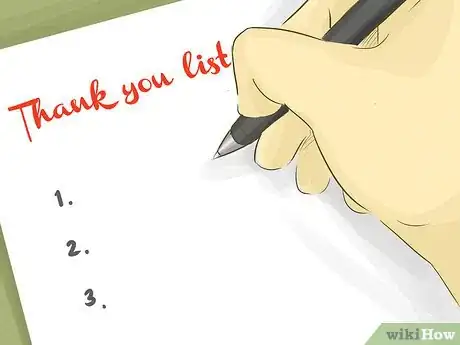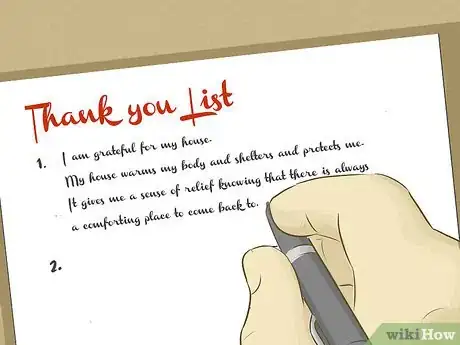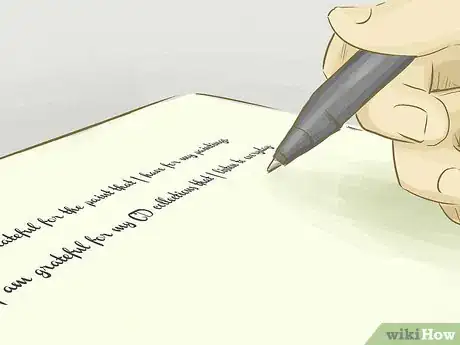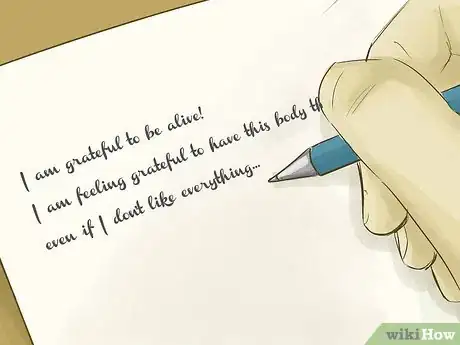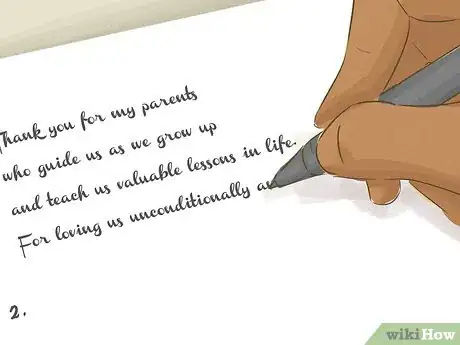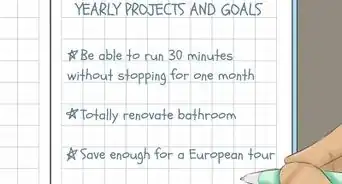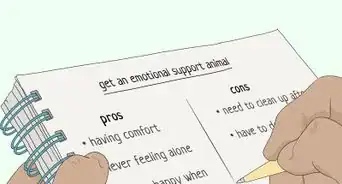This article was co-authored by Sandra Possing. Sandra Possing is a life coach, speaker, and entrepreneur based in the San Francisco Bay Area. Sandra specializes in one-on-one coaching with a focus on mindset and leadership transformation. Sandra received her coaching training from The Coaches Training Institute and has seven years of life coaching experience. She holds a BA in Anthropology from the University of California, Los Angeles.
wikiHow marks an article as reader-approved once it receives enough positive feedback. This article received 11 testimonials and 90% of readers who voted found it helpful, earning it our reader-approved status.
This article has been viewed 268,997 times.
A gratitude journal is a great way to keep yourself in a thankful and positive state of mind. This article will offer some tips for starting and keeping one.
Gratitude Journal Entry Template
Steps
-
1Be Thankful. Thankfulness is an attitude that you can practice and develop.[1] [2] Cultivating gratitude as the norm in your life will make keeping a gratitude journal much easier.
-
2Make it a rule to write down a certain number of things you are thankful for per day.[3] [4] Avoid repeating the same things. This will make writing in the journal more challenging as time goes on, but that's how your awareness and thankfulness will grow. You'll be challenging yourself to find new things to be thankful for that perhaps you never noticed before.Advertisement
-
3Many people start by writing down basic material things that they are grateful for in their lives. It's easiest to recognize things that sustain your life here on Earth like your house, your bed, your clothes, your food etc. Be sure to explain how this makes you feel and why you're grateful for it.[5]
- Example - I am grateful for my house. My house warms my body and shelters and protects me. It gives me a sense of relief knowing that there is always a comforting place to come back to.
-
4Write about extended material things in your life. These things vary from person to person depending on what you like and take interest in. For example, if you love to paint, you may be grateful for the paint that you have. Or, if you like music you may be grateful for your CD collections.[6]
-
5Describe how you are grateful for yourself. You can start by feeling grateful to be alive at all. Then start writing about feeling grateful to have the body you have, even if you don't like everything.[7] Avoid the trap of being grateful for something that is better than what other people have. Instead, compare whatever you are grateful for with how you would feel if you didn't have it at all.
-
6Think about your abilities. You may start with basic abilities like your ability to see, your ability to hear, your ability to walk. Then progress to the extended abilities that are unique to you. Think about skillful things like dancing, singing, writing, and features that make up your character like your listening skills, your skills in cheering up people, your skills in being a good friend.
-
7Consider the people in your life.[8] Think about all the people you care about, like your parents, your friends, your significant other, your pets. Write why you are grateful for each person and how they make you feel. This helps you to appreciate them and see only the good in them. It's also good to write about the people that you don't really like and find a reason to appreciate them. This can be difficult as we don't really appreciate people we don't like but it can be very uplifting. There is good in everyone and it's very mood shifting to find the good in even people we dislike and feel grateful for them.
-
8Write about situations and experiences. There are always situations that have made us happy.[9] For example, you may be grateful for a fun party, a good day at school/work, a fun vacation.
Expert Q&A
-
QuestionShould you journal everyday?
 Nicole Moshfegh, PsyDDr. Nicole Moshfegh is a Licensed Clinical Psychologist and Author based in Los Angeles, California. Dr. Moshfegh specializes in multicultural competence and treating patients with mood and anxiety disorders and insomnia. She holds a BA in Psychology and Social Behavior from The University of California, Irvine (UCI), and an MA and Doctor of Psychology (PsyD) from Pepperdine University. Dr. Moshfegh completed her predoctoral internship and postdoctoral fellowship at The University of California, Los Angeles (UCLA). Additionally, she is a member of the American Psychological Association, National Register of Health Service Psychologists, Los Angeles County Psychological Association, and Collaborative Family Healthcare Association. Dr. Moshfegh is also the best-selling author of "The Book of Sleep: 75 Strategies to Relieve Insomnia".
Nicole Moshfegh, PsyDDr. Nicole Moshfegh is a Licensed Clinical Psychologist and Author based in Los Angeles, California. Dr. Moshfegh specializes in multicultural competence and treating patients with mood and anxiety disorders and insomnia. She holds a BA in Psychology and Social Behavior from The University of California, Irvine (UCI), and an MA and Doctor of Psychology (PsyD) from Pepperdine University. Dr. Moshfegh completed her predoctoral internship and postdoctoral fellowship at The University of California, Los Angeles (UCLA). Additionally, she is a member of the American Psychological Association, National Register of Health Service Psychologists, Los Angeles County Psychological Association, and Collaborative Family Healthcare Association. Dr. Moshfegh is also the best-selling author of "The Book of Sleep: 75 Strategies to Relieve Insomnia".
Licensed Clinical Psychologist Definitely! Try journaling at the same time each day for 15-20 minutes. This can help you build a consistent journaling habit.
Definitely! Try journaling at the same time each day for 15-20 minutes. This can help you build a consistent journaling habit. -
QuestionWhen should I write in my journal?
 Community AnswerYou can write in your journal whenever you like. Writing in it at the beginning of the day can help you start your day off with a more positive attitude. Writing in it at the end of the day can help you collect your thoughts, fill your mind with calm, and help you fall asleep.
Community AnswerYou can write in your journal whenever you like. Writing in it at the beginning of the day can help you start your day off with a more positive attitude. Writing in it at the end of the day can help you collect your thoughts, fill your mind with calm, and help you fall asleep. -
QuestionWhat if I can't think of a single thing to be thankful for?
 DabbuCommunity AnswerThen start with nature. You could be grateful the sun didn't take a holiday today. How about the air that you are breathing? You could also thank God about the body parts that are functioning perfectly to keep you alive. Other topics may include material goods, life itself, love, moments and memories, happiness, passions, relationships, work, success, health, body, something new that you learned or any other thing.
DabbuCommunity AnswerThen start with nature. You could be grateful the sun didn't take a holiday today. How about the air that you are breathing? You could also thank God about the body parts that are functioning perfectly to keep you alive. Other topics may include material goods, life itself, love, moments and memories, happiness, passions, relationships, work, success, health, body, something new that you learned or any other thing.
References
- ↑ Sandra Possing. Life Coach. Expert Interview. 15 July 2020.
- ↑ https://www.health.harvard.edu/healthbeat/giving-thanks-can-make-you-happier
- ↑ Sandra Possing. Life Coach. Expert Interview. 15 July 2020.
- ↑ https://greatergood.berkeley.edu/article/item/tips_for_keeping_a_gratitude_journal
- ↑ https://health.clevelandclinic.org/tips-for-keeping-a-gratitude-journal/
- ↑ https://health.clevelandclinic.org/tips-for-keeping-a-gratitude-journal/
- ↑ https://www.health.harvard.edu/healthbeat/giving-thanks-can-make-you-happier
- ↑ https://greatergood.berkeley.edu/article/item/tips_for_keeping_a_gratitude_journal
- ↑ https://ggia.berkeley.edu/practice/gratitude_journal
About This Article
Keeping a gratitude journal can reduce stress, improve your relationships, and even help you sleep better, and it’s easy to get started. First, find an empty notebook to write in. You can also keep a digital gratitude journal on your phone or computer if that’s easier for you. Start by writing down a few things you’re grateful for each day. You can write about other people, yourself, things that happened to you recently, or anything else you’re grateful for. For example, you might be grateful for how supportive your friends are, that you have a job you love, or how delicious your morning cup of coffee was. You can also start with a specific gratitude journal prompt, like “Name three people who supported you during a tough time” or “What’s one quality about yourself that you’re grateful for and why?” Use a new prompt for each entry if you’re not sure what to write about. Try to get in the habit of writing in your gratitude journal every day to see the most benefits. Journaling will get easier the more you practice, and you may find yourself feeling more grateful in your day-to-day life.



